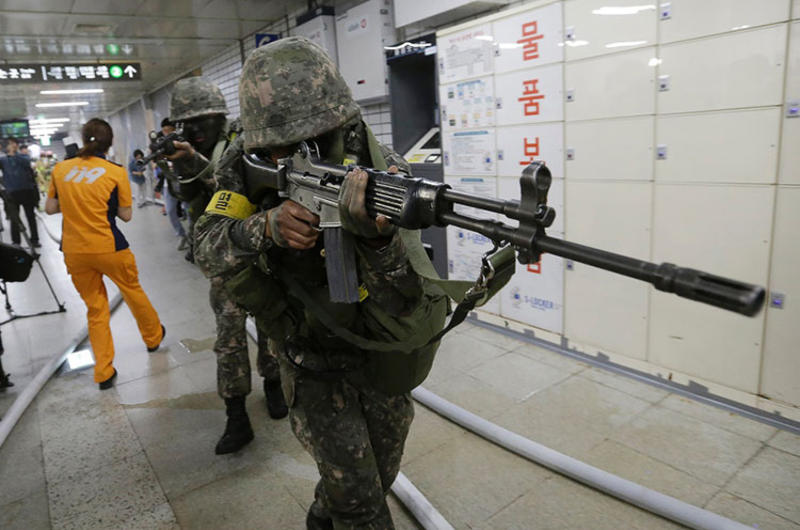US, South Korea on alert as North puts troops in ‘semi-war state’

South Korean soldiers aim their weapons during an anti-terror drill as part of Ulchi Freedom Guardian exercise at a Seoul, South Korea, subway on Wednesday, Aug. 19, 2015. (AHN YOUNG-JOON/AP)
By STAFF AND WIRE REPORTS | August 21, 2015
SEOUL, South Korea — North Korean leader Kim Jong Un declared his front-line troops in a "quasi-state of war" Friday and ordered them to prepare for battle against South Korea in response to an exchange of artillery fire on the border the day before.
With tension rising, U.S. officials said the Americans had suspended their annual military exercise with South Korea but shortly afterward announced the exercise, known as Ulchi Freedom Guardian, had resumed.
Pentagon officials said the largely computer-simulated exercise had been quietly suspended earlier in the week. The announcement that it was back on track came only hours after the suspension was first reported.
The officials spoke on condition of anonymity because they weren't authorized to discuss the matter publicly.
“We’re concerned by the situation and we are watching it very closely,” said David Shear, U.S. assistant secretary of defense for Asian-Pacific security affairs.
Tensions on the Korean peninsula ratcheted up after two South Korean soldiers were maimed on Aug. 4 by land mines planted along the Demilitarized Zone. A U.N. Command investigation determined the mines had been planted by the North along a known South Korean patrol route. Pyongyang has denied involvement.
In response to the attack, South Korea resumed anti-Pyongyang broadcasts through loudspeakers along the border, and the North retaliated with its own broadcasts. North Korea demanded the broadcasts end by Saturday evening.
On Thursday North Korea fired an artillery round into Yeoncheon near the DMZ. The South responded by firing dozens of shells at the point of origin of the North’s round, according to the Ministry of National Defense statements reported by Yonhap News.
While the two Koreas have traded fire several times in recent years, this marked the most serious incident since the North’s sinking of the Cheonan warship in 2010, killing 46 sailors, and its shelling of the Yeonpyeong island later that year that left four dead.
In Pyongyang, a North Korean military official told The Associated Press that senior party and defense officials led by Kim met Thursday night and "reviewed and approved the final attack operation."
He gave no details on what kind of military retaliation North Korea would see as appropriate punishment for South Korea's shelling of its territory on Thursday, according to the AP report.
The U.S. and South Korea have raised alert levels for its troops, South Korean sources said Friday. And Seoul has warned that it will respond strongly to any further provocations, according to South Korean media reports.
On Saturday AP said South Korea had blocked access to a tourist observatory close to the border with North Korea.
However, North Korea permitted more than 240 South Koreans to enter a jointly-run industrial complex at its border city of Kaesong on Saturday.
Approximately 50,000 South Korean and 30,000 U.S. troops are taking part in Ulchi Freedom Guardian exercise. While the allies say the drill is non-provocative and defense-oriented, North Korea routinely says it views the war games as a threat and warned it would respond with strong military action if the exercise were not canceled.
Such threats from the North are common before and during military exercises.
In Seoul, around 100 anti-North Korea activists gathered in Seoul to protest North Korea’s cross-border artillery shelling, according to the AP. Protesters burned posters with the North Korean leader’s photos and a North Korean flag.
“We urge U.N. and the international community to strongly punish and deal with North Korean dictatorship with strong anti-North sanctions and to push the North to renounce nuclear development and weapons,” protester Park Chan-sung told the AP.
Kim Yong Chol, director of the general reconnaissance bureau of the North Korean army, on Friday denied South Korean allegations that Pyongyang was raising tensions on the peninsula. He also denied the North fired anything across the DMZ and said South Korea has not offered conclusive evidence where the rocket was launched in the North, or where exactly it landed in the South, the AP reported.
He suggested human error might have been a factor on the South Korean side and says the South's decision to retaliate with its own barrage was dangerous and rash.
"Skirmishes can lead to all-out war," Kim Yong Chol told the AP.
USFK, which will not discuss specifics on alert or readiness levels, said Thursday night that the command was closely monitoring the situation.



